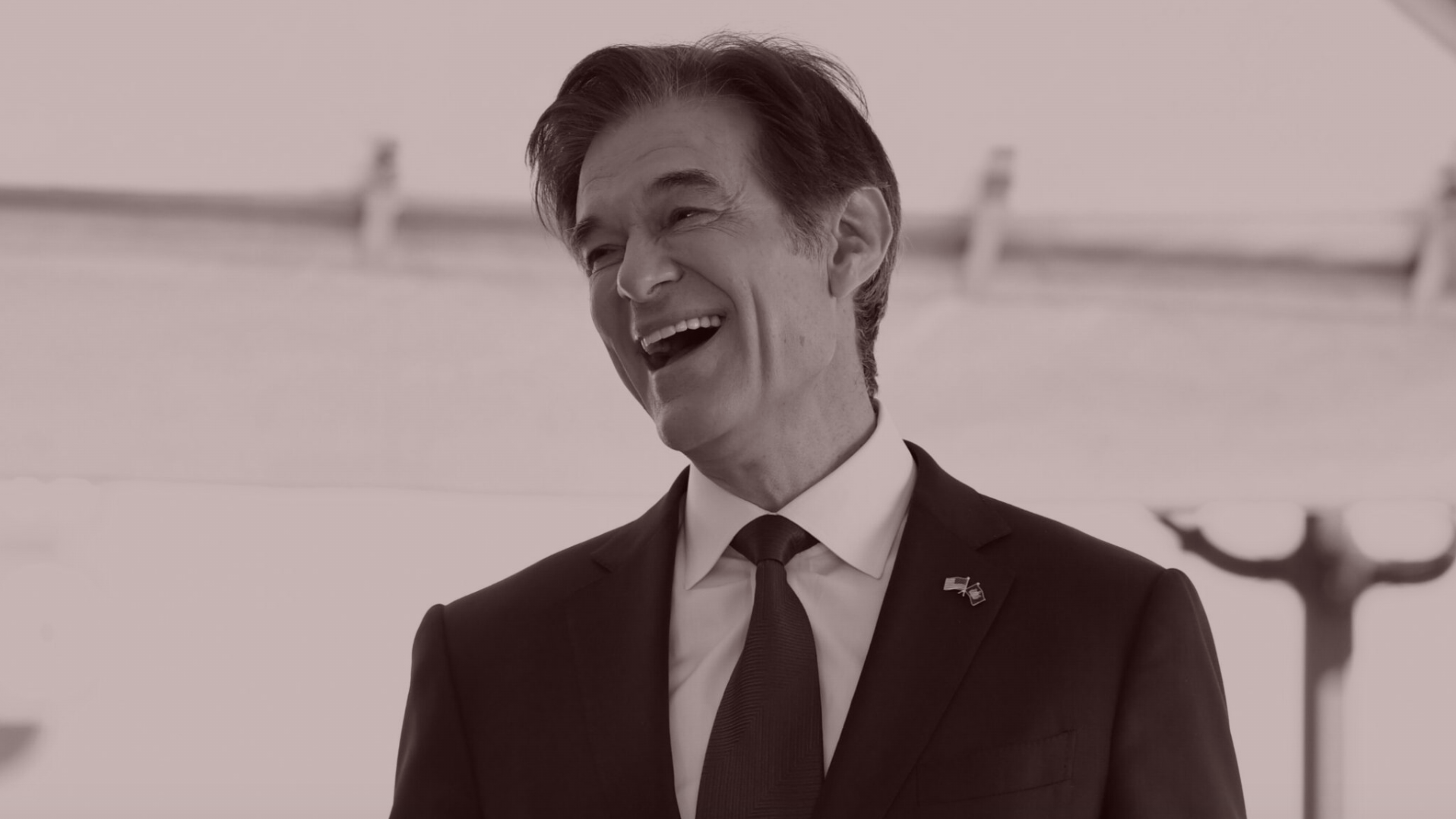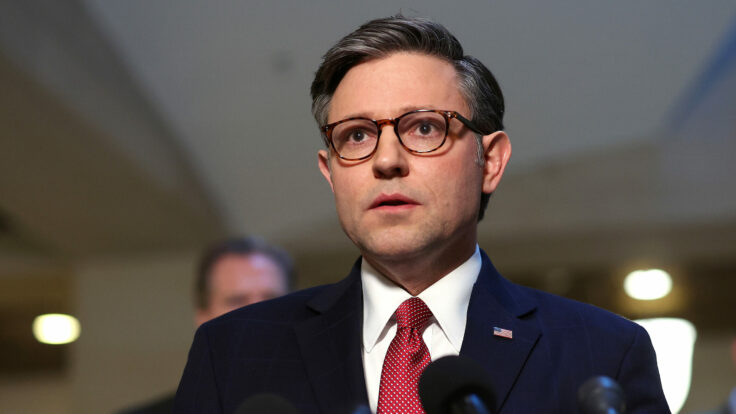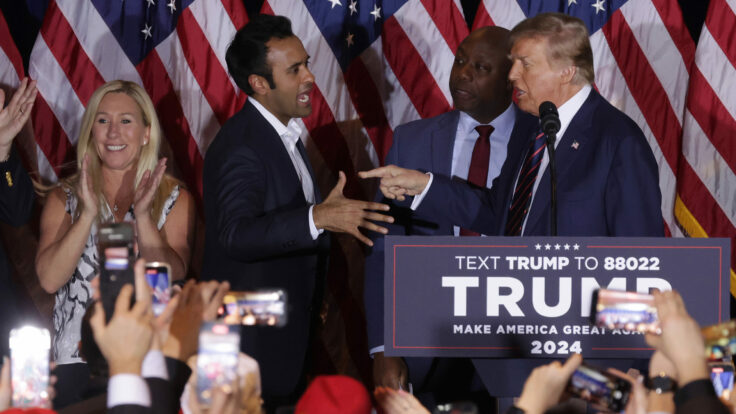 |
|
Welcome back to The Washington Mall, your favorite bi-weekly dissection of what’s really happening in this town.
A quick note that this column will be off on Monday before returning next Thursday. It may be summer for you, but my notebook is rapidly filling up with news, so stay tuned for some great stuff that you won’t want to miss, even if you’re reading this on the beach rather than your office on Capitol Hill or on K Street.
In this issue: Dr. Oz, Frank Luntz, Carolyn Maloney, Jerry Nadler, Kevin McCarthy, Ritchie Torres, Mondaire Jones, The New York Times, Patrick Schmidt, Al Franken, and many many more.
|
 |
| The Whims of Oz & Carville’s Next Act |
| A look inside Kevin McCarthy’s annual Jackson Hole strategy mixer, where an unmentioned Trump loomed larger. Plus, James Carville’s next act and why Nadler won in New York. |
|
|
|
| It’s been a confounding few months for expert TV doctor and political neophyte Dr. Mehmet Oz: After vanquishing Dave McCormick in the hotly-contested food fight of the Republican primary, he’s been accused of phoning it in during the general against John Fetterman, who had to sit out several months of campaigning while recovering from a stroke. Oz, of course, was never a preternatural politician. His background is in medicine, broadcast television, and TV-adjacent lifestyle businesses. He’s from New Jersey, not Pennsylvania, and his personal politics don’t easily align with the rightward demands of the base. And yet rather than gloss over these vulnerabilities, he’s largely exacerbated them with Bush I and Romneyesque rich guyisms—inventing a portmanteau for Wegmans and Redner’s, not knowing how many homes he owns—that make him an incongruent fit in a working class state. Hedge fund C.E.O. and Dina Powell’s husband David McCormick went to great lengths to transform himself into “Dave.” Oz, who I recently reported spent part of the summer on a European jaunt, is failing to catch up to the “regular guy” race.
His reputation as a globe-trotting, aloof candidate has increasingly vexed his party as the Republicans lose their grip on what once seemed like a lay-up: retaking the Senate. Trump-endorsed candidates like Oz, Herschel Walker, J.D. Vance, and Blake Masters now hang like dead weight over the party. And this may explain why many were surprised when Oz made an unexpected appearance, last week, at Kevin McCarthy’s exclusive annual confab for donors at the Four Seasons in Jackson Hole, where the House minority leader charted out how the Congressional Republicans were going to win the midterm elections. “When he showed up, everyone was like: why is he here?” remarked one attendee.
Why, in other words, was Oz missing out on what could have been valuable hours otherwise spent with constituents in Pennsylvania to hob-nob with McCarthy’s donors? In reality, however, Oz needs both. His campaign had little more than $1 million on hand at the end of June, and needs to raise more cash, unless he wants to self-fund, which candidates almost never want to do. Moreover, it seems, Oz was also there to give and receive spiritual counsel. To that end, he was seen huddling in a private room with the legendary yet controversial Republican pollster Frank Luntz, which “reeked of desperation” to some more seasoned observers.
Luntz, McCarthy’s favorite pollster and former roommate, is the guy you go to for some secret messaging, repeat-three-words jiujitsu when your campaign is on the ropes. But apparently that’s actually not what the two were discussing. According to Oz’s team, they are friends but not working together. “I had a stroke two years ago and he helped with my recovery,” Luntz explained. “He taught me about intermittent fasting. Whenever I see him, I thank him.” Luntz added that he’s no longer doing political work.
The pre-emptive gossiping about Oz and Luntz’s reunion merely underscores the level of frustration in the G.O.P. As for those congressional races, McCarthy offered a pretty sober projection that the G.O.P. would pick up 15 House seats—not dissimilar to the current 538 forecast—and, if everything remains static until the election, possibly more. In fact, that projection reflects some weakening of the political headwinds that were buffeting Democrats before the Dobbs ruling in late June. As attendees acknowledged within the first session, the Supreme Court decision striking down abortion rights has energized moderate and independent voters, in addition to Democrats, diminishing the electoral advantage that previously favored Republicans. Their own polling showing that 30 percent of the country is pro-life and 70 percent is pro-choice.
Perhaps most remarkable, however, is that McCarthy’s turnout models didn’t factor in the possibility that Donald Trump could announce his presidential run ahead of the midterms. “I never heard Trump’s name once,” noted one attendee. “The unsaid made the point. They need to run their playbook regardless of what he will do. There weren’t even conversations about turnout models if Trump gets into the race.” Another attendee confirmed that Trump was not raised as a factor in political discussions, not even when discussing turnout. He was only mentioned in passing in some small breakout groups around policy.
That makes a certain amount of sense. Trump bulldozing his way into the ‘24 race ahead of the midterms would be a black swan-like event—not impossible to predict, but almost impossible to prepare for. “If you open the Trump box there’s a million questions and you can’t answer them,” the first attendee said. “The bigger macro takeaway is that they wish he would go away.” And can you blame McCarthy? If he says anything about Trump to donors it will leak and then he’ll endure the wrath in Bedminster.
As it turns out, Trump may not end up being a pre-midterm party crasher anyway. According to a source close to the former president, who spoke to him days after the F.B.I. raid on Mar-a-Lago, conversations about announcing before the midterms have seemed to taper off. Whereas Trump was once anxious to declare his presidency early, in order to forestall a ‘24 challenge from the likes of Ron DeSantis, he’s been somewhat reassured by all the G.O.P. wagon-circling that the primary field might freeze itself. “Maybe he’s distracted,” the source said. “Or he’s confident that if he wants to run, he doesn’t need a surprise announcement to clear the field.”
|
| Rick Scott’s European Vacation |
|
| As Republican odds for retaking the Senate continue to deflate, thanks in part to a slew of questionable, neophyte candidates like Walker, Masters, Dr. Oz, and Vance, the intra-party blame-game has transitioned to a whole lot of moaning about money. Namely, why is the National Republican Senatorial Committee pulling ads in battleground states like Pennsylvania, Arizona, Wisconsin and Nevada while holding massive fundraisers featuring seven-plus candidates, as my colleague Teddy Schleifer reported, in an election year when the fundamentals ought to favor the G.O.P.? No one will deny that the Democrats have accumulated a huge cash advantage this cycle. To quote an N.R.S.C. flier, “We face a significant headwind: Democratic Money!” The Democratic online fundraising platform ActBlue raised more than a half a billion dollars in the second quarter. They made $90 million alone on the day that the Supreme Court struck down Roe.
With 75 days to go before the midterms, the finger-pointing is beginning to resemble a circular firing squad. Among the shotgun blasts was a story that appeared in Axios on Tuesday exposing Senator Rick Scott for slipping off to Italy for a luxury yacht cruise in the Mediterranean. Allies of Mitch McConnell—who has a competitive and tense relationship with Scott due to his policy grandstanding and cozying up to Trump—affected bewilderment that the N.R.S.C. chair would spend these final election weeks on vacation. A Scott supporter retorted that McConnell wouldn’t know how to have a good time if he tried.
There are, of course, plenty more fingers pointing at Scott for not backing more viable candidates in the primaries or spending enough time on candidate recruitment. Others are saying the same of McConnell, whose bogeyman status among the far-right voters that now dominate the primaries has only been amplified because of his feud with Trump. But McConnell has never much cared about what people think of him, beyond his reputation for steering the Senate. To wit, his Senate Leadership Fund PAC is dropping an additional $28 million on ad buys in Ohio to support Vance (who has expressed misgivings about supporting McConnell). Back in April, S.L.F. announced they were spending $141 million in ad buys in the Fall on races that didn’t include Ohio at the time, which was seen as a safe seat that Trump won by 8 points.
Meanwhile, Trump’s Save America PAC has yet to pony up in a substantial way since giving $1.5 million to a PAC supporting Walker early on. Instead of lending his name to the party’s fundraising organs like the R.N.C., N.R.S.C. or N.R.C.C., he sent a cease and desist, months after leaving office in early 2021 for using his name and likeness to fundraise, ostensibly hampering their grassroots fundraising abilities. Trump has maxed out donations to the individual candidates he’s supported, at the $5,000 level, via Save America PAC, but other candidates, including Vance, who raised just $1 million last quarter, are still waiting for the Trump windfall. Sure, the Save America PAC pays the costs for co-rallies, but Trump has otherwise been notoriously stingy with his own $100 million cash pile.
He may be hoarding money for 2024, but it’s a potentially shortsighted move, according to some allies who wonder if Trump is burning political capital by allowing these candidates to fail. “If there’s a void and a vacuum and you want to be the leader of the party going forward, you’ve got to spend money to fill that void,” said a Republican strategist who has worked on some of these struggling campaigns. “It’s a no brainer. He’s sitting on a lot of money, the money he spends on these key states now and these candidates, is only going to help them, and help him when he runs in 2024.”
My sources in Trumpworld are saying it’s still early, and they expect him to eventually spend as the election draws nearer. At the same time, one countered, retaking the Senate “is not Trump’s job—it’s Rick Scott’s and McConnell’s.”
|
| Dethroning the Kings of New York |
|
| Dragons were slayed this week in New York’s primary battles: Mondaire Jones, an ascendant 35-year-old openly gay Black congressman, lost to Dan Goldman; and the idiosyncratic but legendary Carolyn Maloney, 76, fell to Jerry Nadler in an epic re-districting battle. I first met Maloney when I was a young reporter covering City Hall for the New York Post and she was fighting for things like bringing Chinese Pandas to the Bronx Zoo and hanging the shirt worn by the Navy Seal who killed Osama Bin Laden in the 9/11 museum. She was a total street fighter, who never missed a protest or rally, and who Nadler’s team reportedly tagged as senile for some of her more zany appearances. She memorably fought hard for the 9/11 first responders alongside Jon Stewart, showing up for hearings and media ops in full firefighter gear.
The debates between Nadler and Maloney were embarrassing, and did not earn much love from the White House, especially when Nadler and Maloney couldn’t decide if Biden should run in 2024. Jen O’Malley Dillon’s husband tweeted that donations should go straight to upstart Suraj Patel.
Nadler, 75, had a few things on Maloney. For one, he had organizational infrastructure with a chief of staff like Amy Rutkin, who has worked with him for more than 20 years, lives in his Upper West Side district and has strong ties to the all-important Democratic clubs, which overwhelmingly endorsed Nadler. Donors who hated having to choose between the two, looking for direction on a candidate, used the clubs as air cover for deciding where to put their cash.
Maloney also had her own organizational issues, employing three chiefs of staff over three years. Her cash position and standing was knocked down by two prior primary challenges from Patel in the past two cycles. There was also a calculation that Nadler’s posting on the Judiciary Committee was a more powerful seat for the New York delegation than Maloney’s chairmanship on House Oversight. In the end, Nadler had the endorsement of Chuck Schumer and The New York Times.
Another rising star, Rep. Ritchie Torres, who suffered from mild redistricting but went unchallenged in the primaries, attributed the outcome of the New York City races to endorsements—“the sheer power of The New York Times,” as he put it. “All of the endorsed candidates of The New York Times won,” he rightfully pointed out to me. Indeed, the imprimatur of the Times counted for more than Alexandria Ocasio-Cortez’s endorsement in the race between incumbent Sean Patrick Maloney, the D.C.C.C. chair, and his progressive challenger Alessandra Biaggi, an A.O.C. ally, in a newly redrawn district. Goldman, the former impeachment lawyer, was also able to oust Jones in his new district with the help of the Times.
But what about Maloney? Everyone who knows her does not predict a sedentary retirement as her next phase in life: no bingo nights or trips to the slots at Resorts World out by the airport. Maybe she could have angled for that open ambassadorship in Croatia, but that might be a very tall ask from the Biden administration after her questions about whether he should run again. People close to her say they could see her leveraging her friendship with Mayor Eric Adams, whom she endorsed, into another role within the city.
|
| Kansas’s Tasmanian Candidate |
|
| Now for something a little different: This week, I want to shine a light on Patrick Schmidt, a 31-year-old Democratic first-time candidate for a ruby-red house seat in Kansas’s 2nd district. Schmidt somehow managed to get the attention of James Carville, former D.C.C.C. chair Steve Israel, Rep. Emanuel Cleaver, David Gergen, and even E Street Band and Sopranos legend Stevie Van Zandt, who threw him a fundraiser in New York with Al Franken.
By all metrics, Schmidt doesn’t have a shot in hell in his district, which Trump won by 12 points in 2020, but all of these Democratic legends say he’s a Southern Democrat whose Tasmanian work ethic deserves a fair look from Maloney and the D.C.C.C. as they evaluate where to place valuable donor dollars. Schmidt, after all, is a Horatio Alger-ish Franken-dream candidate of a certain variety: He is a former naval officer and son of teachers; he speaks Persian; his campaign manager is a chicken farmer; he has raised $700,000 on his own and has knocked on 35,000 doors. After I was connected to Schmidt, he described to me his “beg, borrow and steal” campaign; then he had Carville, Cleaver and an active duty officer call me too, to vouch for his work ethic and how he’s closing in on one-term incumbent Republican Jake LaTurner.
Maybe Schmidt has a shot. He’s trying to argue to Maloney that the game has changed in Kansas’s 2nd as 19 percent of voters were unaffiliated when they voted on the abortion referendum that failed in the state by 18 points. He believes the 126,000 No Votes in his district are almost enough to win in November. “I told people in leadership, this kid is working like a Tasmanian monster, he may be one of the sleepers in this election year,” Cleaver told me, after Schmidt asked him to reach out. “I think he has pretty much been not taken seriously by the election arm of the Democratic caucus, D.C.C.C. He has, in spite of that, really put on a show for the members of the caucus.”
Carville, too, was high on Schmidt. “We’ve seen miracles happen in Kansas. I have a soft spot for these red state Democrats, I have never seen anyone work harder, more persistent,” Carville called to tell me. “I pay more attention to candidates than I do to districts. He’s a pretty aggressive guy, he’ll shoehorn his way in; I’m trying to give him some air cover.”
Carville, who is 78, and is famous for his work with Bill Clinton, sees the next years of his life as identifying and mentoring young talent in the party.
“The thing about politics is that it can be addictive,” he told me. “I want to get talented young people on the crack pipe.”
|
|
|
|
| FOUR STORIES WE’RE TALKING ABOUT |
 |
| Loeb’s Disney Punch List |
| Will Chapek cave to Loeb’s list of demands aimed at slashing Disney’s $50B of debt? |
| WILLIAM D. COHAN |
|
 |
|
 |
| The Putin Proselytes |
| Somehow, Putin’s misbegotten war is more popular than ever in the motherland. |
| JULIA IOFFE |
|
 |
| The HBO Max Massacre |
| Matt and Julia dissect Zaslav’s culling of 36 shows from HBO Max. |
| MATTHEW BELLONI & JULIA ALEXANDER |
|
|
|

|
|
|
| You received this message because you signed up to receive emails from Puck
Was this email forwarded to you?
Sign up for Puck here
Interested in exploring our newsletter offerings?
Manage your preferences
Puck is published by Heat Media LLC
227 W 17th St
New York, NY 10011
For support, just reply to this e-mail
For brand partnerships, email ads@puck.news
|
|
|













